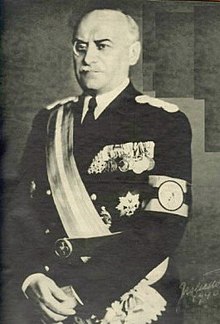
Back Ion Gigurtu Danish Ion Gigurtu German Ion Gigurtu Spanish Ion Gigurtu Estonian Ion Gigurtu Finnish Ion Gigurtu French יון ג'יגורטו HE Ion Gigurtu Italian Ioannes Gigurtu Latin Ion Gigurtu Malagasy
Ion Gigurtu | |
|---|---|
 | |
| Prime Minister of Romania | |
| In office 4 July 1940 – 5 September 1940 | |
| Monarch | Carol II |
| Preceded by | Gheorghe Tătărescu |
| Succeeded by | Ion Antonescu |
| Personal details | |
| Born | 24 June 1886 Turnu Severin, Mehedinți County, Kingdom of Romania |
| Died | November 24, 1959 (aged 73) Râmnicu Sărat, Buzău Region, Romanian People's Republic |
| Political party | People's Party (to 1932) National Agrarian Party (1932-1935) National Christian Party (1935-1938) National Renaissance Front (1938-1940) Party of the Nation (1940) |
| Profession | Officer, industrialist |
| Military service | |
| Allegiance | Kingdom of Romania |
| Branch/service | Romanian Land Forces |
| Battles/wars | Second Balkan War World War I World War II |
Ion Gigurtu (Romanian pronunciation: [iˈon d͡ʒiˈɡurtu]; 24 June 1886 – 24 November 1959) was a far-right Romanian politician, Land Forces officer, engineer and industrialist who served a brief term as Prime Minister from 4 July to 4 September 1940, under the personal regime of King Carol II. A specialist in mining and veteran of both the Second Balkan War and World War I, he made a fortune in interwar Greater Romania. Gigurtu began his career in politics with the People's Party (PP) and the National Agrarian Party, moving closer to the far right during the 1930s, and serving as Minister of Industry and Commerce in the cabinet of Octavian Goga. Shortly after the start of World War II, Gigurtu was affiliated with King Carol's National Renaissance Front, serving as Public Works and Communications Minister and Foreign Minister under Premier Gheorghe Tătărescu, before the territorial losses incurred by Romania in front of the Soviet Union propelled him as Tătărescu's replacement.
Gigurtu's executive was primarily noted for realizing the inability of France and the United Kingdom to guarantee Romania's borders and, accordingly, for the alignment with Nazi Germany. As part of this program, Gigurtu most notably enforced official antisemitism and racial discrimination, implementing locally a version of the Nuremberg Laws. Despite such measures, the government fell after being compelled by Germany to accept the cession of Northern Transylvania to Hungary, and was consequently forced to resign amidst nationwide protests. Gigurtu retreated from public life for the rest of the war, and, following the pro-Allied coup of August 1944, was arrested, investigated and released several times. Ultimately prosecuted by the newly proclaimed Communist regime as part of a show trial, he eventually died in prison.
© MMXXIII Rich X Search. We shall prevail. All rights reserved. Rich X Search